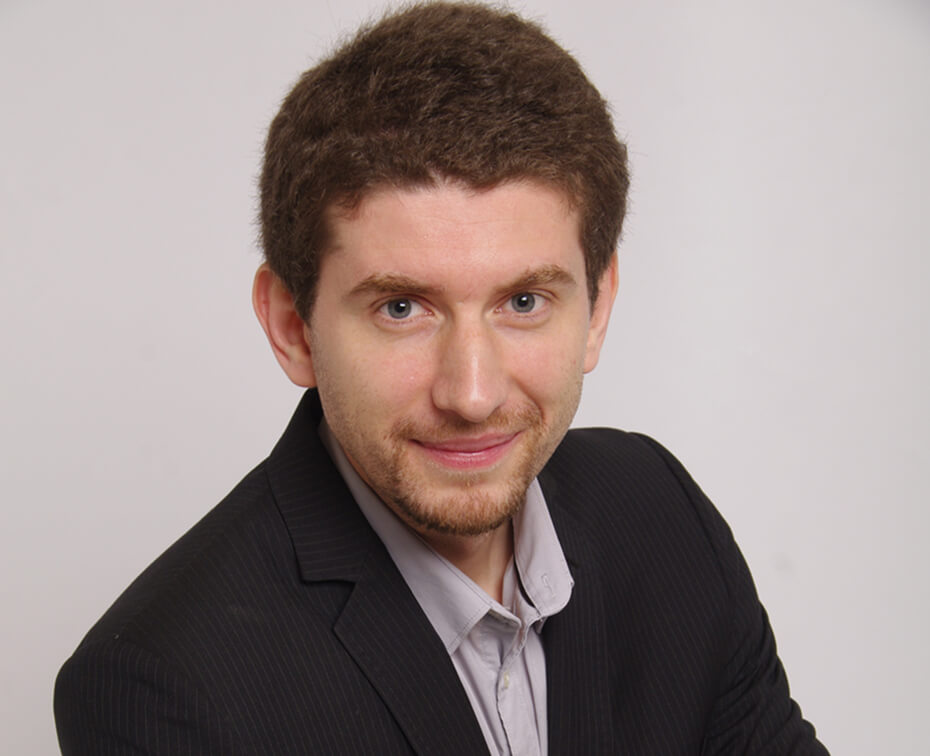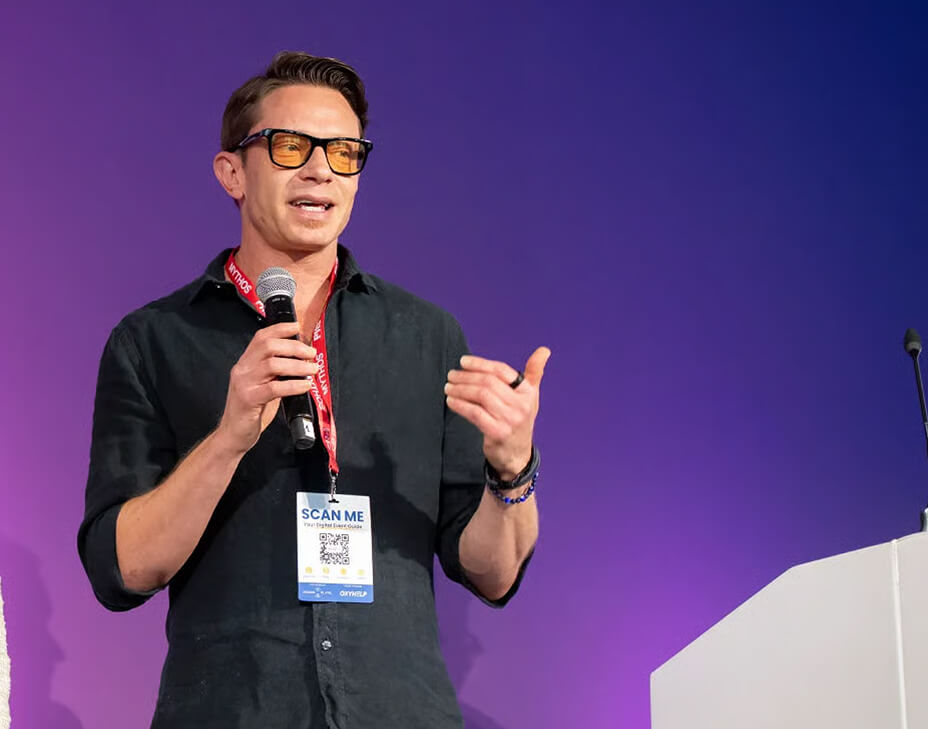What Can You Learn From a Disappointing GlycanAge Result?
What happens when you invest a lot of time in your longevity, only to find out you have a bad GlycanAge result? It's time to rethink some of your lifestyle choices and find out how to take better care of your body and mind.

I usually present interviews with people who have excellent GlycanAge results, in an effort to teach you how to achieve longevity. However, it’s also imperative to share stories about people with bad results, because we can learn so much from them. This is the story of Gabriel Cian and how he’ll improve his result and help others along the way.
What is your GlycanAge and your chronological age?
Chronologically I’m 42 and my GlycanAge is 74.
When you first tested your GlycanAge, what were your expectations?
Well, I thought of myself as being perfectly healthy. Definitely above average. I didn't have any symptoms or known health issues. So I was very optimistic about my GlycanAge, and I was really surprised to find out my result.
Also, there were a couple of problems I've been having for a while, that didn't manifest in any types of symptoms, but the test picked up as reasons for high levels of inflammation. But overall, I was surprised to see that my health wasn't as great as I thought it would be. And at the same time, I felt really lucky to know about this early enough to take preventative measures and change my lifestyle.
This is amazing. I usually interview people who had a good result because people who had a bad result don't want to share it. But this is actually such an inspiring story because a bad result means that you have so much room for improvement.
Absolutely. This is how I've taken it. Also, I was really excited about the progress in the diagnostics and interpretation of the results, because I wasn’t just given the number 74. It's a big number, and I wouldn’t know what to do about it.
But I was given the diagnostics and interpretation that is much more detailed and you can see what your risk factors are, the correlations between the results and your lifestyle and what you can do to improve it. So, I thought it was really great not only to have the result but also to have some keys to understand what this number is about and how to improve it.
Can you share some of the changes you implemented after the test?
To be honest, I've been spending a lot of time on longevity and health issues. So it's not only GlycanAge, it's a lot of other things like blood labs, and glucose management. At first, it was just a warning sign, and then I did additional exams and found out I was at a threshold between healthy and pre-diabetic.
I also did DNA sequencing to look at some genes that show a predetermination towards glucose and metabolic syndrome. Well, long story short, I had two doctors interpret the results and their advice led me to stop eating sugar altogether.
That’s not the only change I made in my diet. I changed the order of the different categories of food. I ate fibre, then proteins and fats, and as a last step - fruits. But this still wasn't enough. So I stopped eating any food that contains more than 10% carbohydrates.
I have been doing intermittent fasting for like 30 years. It started because as a schoolboy, I wanted to sleep in so I naturally skipped breakfast.
After ten years or so, my schedule changed and I could have breakfast without getting up too early in the morning and I gained 2 or 3 kilos in one week. So it was a very strong sign for me that I should continue skipping it.
Also, I changed my physical activity routine to increase muscle mass because it helps with glucose management.
Last but not least, I’ve purchased metformin because my mom is diabetic, type two. So you see that there's this whole sort of small signs that I could go in the same direction if I’m not careful about it.
So now I'm going to test the metformin to see if my glucose levels could go even lower. Something else that’s very important that I wasn't aware of was sleep. I had that kind of philosophy of - You're going to sleep when you're dead.
I was sort of very proud of myself for how little sleep I would get. When I purchased the continuous glucose monitor to monitor my glucose levels, I saw what the lack of sleep was doing to my absorption capability. So when I didn't sleep, the spikes were crazy high, and they were going down little by little.
Whereas when I was in a restful state and I slept well, the glucose management was completely different. So I've started sleeping for 7 to 9 hours. It was a big, big breakthrough compared to what I was I had been doing for years before.
Was it easy to start sleeping more?
Honestly, this is the most difficult part. Stopping sugar was pretty easy for me. I know it's very hard for some people, but not for me. Increasing my physical activity was pretty easy also.
But during the evening, when I'm in concentration mode, it's very hard for me to stop and go to sleep. This is still a work in progress, but I've already made some progress compared to the starting point last year.
Do you take any supplements for sleep?
I don't because honestly, I don't have problems with sleep, I have problems with self-discipline and being able to interrupt my work and other responsibilities in order to wind down. I'm able to go to sleep by 11 p.m. right now, but I still stay in bed for about 30 or 45 minutes and then I fall asleep.
Other than metformin, are you taking any other supplements?
Well, I've purchased rapamycin, which is hard to get in France, since we’re one of the most regulated countries in the world when it comes to medication. Seeing how it’s a transplantation drug, no doctor would give me the prescription, but I found, alternative ways which are 100% legal, but don’t involve French doctors.
I’m going to start experimenting with it soon, but I want to approach it from a scientific stance and measure everything to make sure it’s useful and not harmful. Because I know there are so many people who take vitamins or supplements because they think it's good, but I’m not satisfied by this kind of attitude.
So I’m looking for ways to measure rapamycin’s effects, one of the biomarkers is going to be GlycanAge, but it won’t be the only one.
I’m excited to see your progress. What is your exercise routine?
I’ve been very active for years. I had a swimming pool close to where I lived, so I often went swimming for 30 to 60 minutes. It was great. But, I didn't have specific goals to push myself. I was just swimming. Then the swimming pool closed, and I started running.
I’m still running, but I also do high-intensity training, and strength training, and I play sports. My goals for this year are to improve my VO2 max so that I can increase my muscle mass, as well as to improve the health of my joints and my flexibility.
Did you go through any life event that was a turning point for you to change your lifestyle?
There was an inflection point. I'm a software programmer and a tech entrepreneur, I created multiple startups and sold some of them in the process. Two years ago, I sold my last startup, and it was a very successful exit for me. It completely changed my life, and my perspective, and, it made me ask myself - I'm at the middle point of my life, what would I do in the last half of it?
Am I going to continue trying to earn as much money as possible? This is not the priority anymore. So it was a big reflection time for me to think about what would be my next goals in life and I decided on longevity.
I've been fascinated with it, and I started leading by example by creating startups dedicated to longevity.
There are two parts here. There's the health and preventative health part, which is very tangible. And people can apply this. There's so much to do right now with the knowledge we have today.
The other one is more biotech, trying to find the mechanisms of ageing and trying to slow them down or even reverse them. So for me, I'm all into longevity right now, and, you can’t do this and be credible if you don't apply it to yourself.
What do you expect from future GlycanAge tests?
This is a very fascinating topic. For me, GlycanAge is a great biomarker. However the human body is very complex, and sometimes you have different biomarkers that contradict themselves. And I've seen this with my glucose analyses. Some of them were accurate and showed that I was in good health and other ones were worrisome. So I think it's very important to have as many biomarkers as possible to allow you to interpret the results in the way that is the closest to reality.
I’ve had a very interesting discussion with one of my doctors, related to DNA sequencing, which is forbidden in France. It's completely illegal, if you are a doctor and you prescribe this, you go to prison.
I found a way to do it legally and it gave me additional insights and confirmed some hypotheses. And the more data points you have, the better you're going to get at analyzing yourself and understanding your body. So when it comes to GlycanAge, I would like to do this test every six months or so and include it in my monitoring routine and use it as a data point.
I've reviewed your customer report with somebody from your team and privately with my doctor as well. Hopefully, since I've made a lot of lifestyle changes, it will translate into a better result.
Do you have any advice for people who are just starting off on their health journey?
Well, you might be interested to look at one of the startups I'm creating right now with a couple of fellow entrepreneurs and doctors. What we offer is a mix of artificial intelligence, medical expertise and coaching to help people start their health and longevity journey.
It’s a great way to dive into the complexities of preventative health, as well as the interpretation and the measures that they need to apply to their lives. And I think it's very important to be knowledgeable about what's coming right now because there's so much scientific literature.
Some of them are pertinent, and some of them are not. So it's very hard to be up to date with what's going on. So, the system we are creating right now is going to be an invaluable tool for patients and doctors.
A doctor is just giving you the prescription, the recommendations. But it's not his job to make sure that you implement them in your daily life. So this is where the coach is coming into play and he's going to help you, step by step, implement everything or at least what you want to, and make sure that you don't give it up after two weeks because it's too hard.
I'm really excited about this. There are 3 billion people who are older than 40 in the world today, and our long-term goal is to help them make better and more educated choices so that they can achieve longevity.


